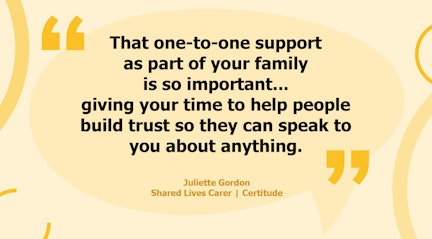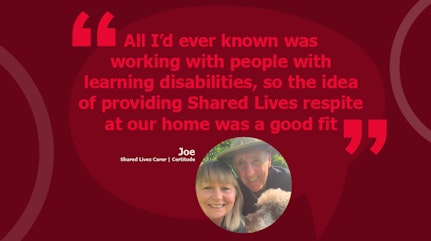Shared Lives Case Study | Juliette’s Story
-
Case Studies

I have been a Shared Lives Carer with Certitude for eight years. Before that I’d been a care worker for elderly people, I was also a live-in carer for a woman in Kensington who was 104, and I was a foster carer for 25 years.
I first heard about Shared Lives when I was caring for a young woman who was about to become 18. She had asked if I could continue her care even though she was moving into a Shared Lives scheme. I’d never heard of it before, so after it was explained to me, I was sent a link to apply to be her Shared Lives carer with Certitude. The Shared Lives team went through the process with me, which was swift because we didn’t need to go through the matching process in the same way as others as she had already chosen me.
I remember having a few different meetings with people, but the third person I met helped me with the paperwork and supported me through until approval. Because of fostering, I knew what to expect with the process. The identification checks and going to a committee for approval are all quite similar. After I was approved the young person lived with me until she was ready to move to the next stage in her life.
Because people’s needs change as they get older, I’ve had a few different people living with me over the years including a lady called Anne who lived with me for three years until her support needs changed and she moved into residential care. Since then, I’ve been doing respite Shared Lives care, often for the same people who stay with me again and again.
This kind of work has always been my passion. I was raised by my grandmother and from a very young age I started caring for her. My father died when I was nine and my mum died when I was 15. As the eldest of seven children, I looked after my family.
Regardless of the challenges it might bring, supporting people was always enjoyable for me. When I was growing up, my grandparents and my mother would often bring children from different parts of Sierra Leone into the home to support them through their school years until they became adults. So, seeing all of that becomes part of my make up. Over the years, I’ve learnt that I'm a very empathetic person. I love to help people generally, in my community and as part of my church, it makes me happy which is what makes it easy.
My children, who are now 49 and 47, have always supported what I do. My family are here on Sundays and so anybody I’m supporting who comes into my home becomes part of my family. We will all have lunch or go out for a drive or visit my daughter who lives in Portsmouth. When Anne lived with me, she loved a visit to Brighton, so we would often go there, even in the winter.
Thinking back to when Anne was with me full time, I’d always been able to find time for myself. Anne would go to an activity centre each day, so it was an ideal opportunity to go to the gym three or four times a week. Also, in the evening, after we'd chatted and had dinner and she’d settled and gone to bed, I always made sure that I had one hour to myself before saying my prayers and going to sleep.
Now, my weeks vary dependent on who I’m supporting. I have an elderly lady called Mary who often stays with me, who loves going out. We’ll do things every day, which is really motivating for me. I often feel that she gives me a lot more than I give her. We go to the ladies’ afternoon at my gym and have fun with all the other people.
Whilst I love doing the respite, if I’m honest, I still miss having somebody to support full time. The experience gives me a deep understanding of different people, their needs and how they think, which is really fulfilling for me.
That one-to-one support as part of your family is so important, giving your time to help people build trust so they can speak to you about anything. You quickly pick up if something is not right so you’re able to give them the support that they need. It's just more personal.
Over the eight years with the Shared Lives team, I have had some great coordinators, and managers at Certitude. Even though you get lots of training and experience, sometimes as a Carer, when people are having a hard time, and particularly if you’re an empathetic person like me, you absorb what’s going on and feel a bit drained. My coordinator will always listen, give advice or ask ‘what do I need’. By the time I come off the phone, I am laughing and feeling joyful again. Sometimes you just need someone to remind you that you're OK, that you've got this and it's all fine.
I feel so blessed to have had such wonderful people living with me in my home, to have that opportunity to support them and maybe make their day a little better. I think that's the greatest thing.



